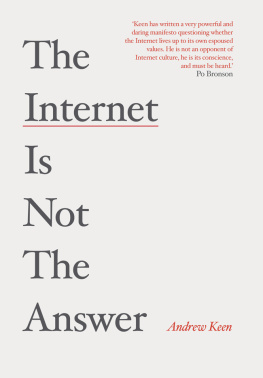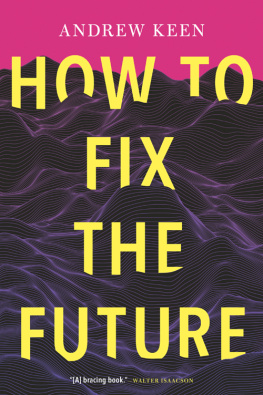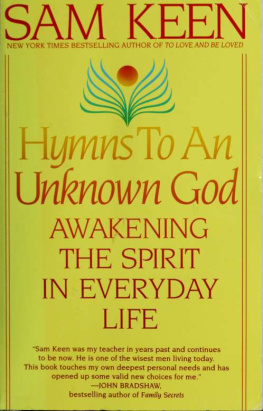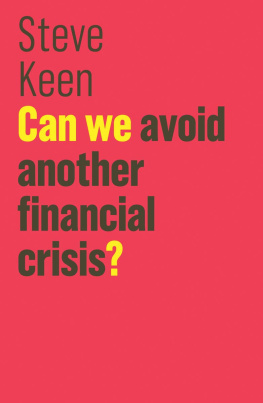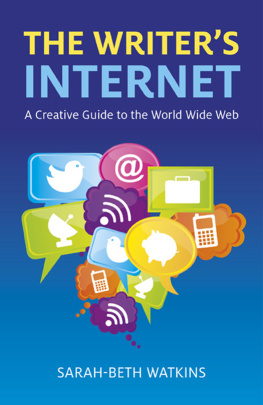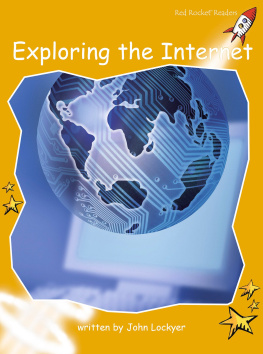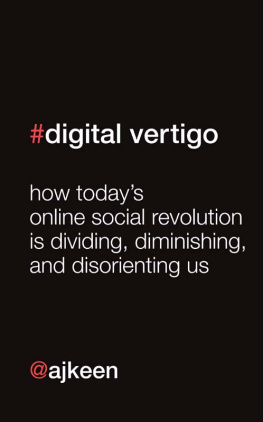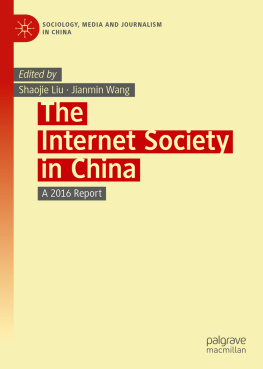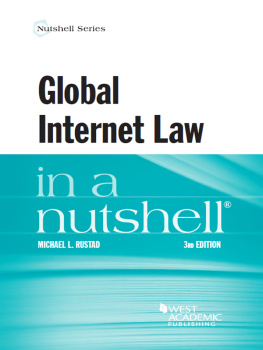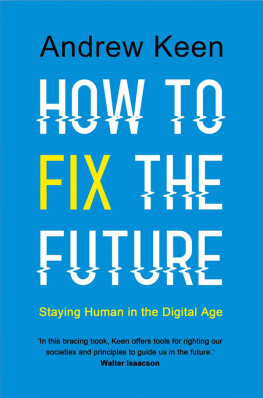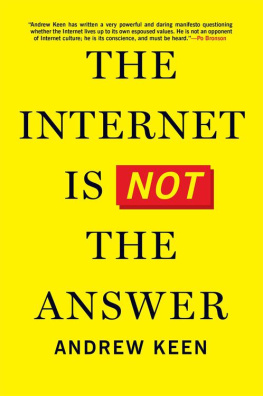THE
INTERNET
IS NOT THE
ANSWER
ALSO BY ANDREW KEEN
The Cult of the Amateur: How Todays Internet Is Killing Our Culture
Digital Vertigo: How Todays Online Social Revolution Is Dividing, Diminishing, and Disorienting Us
First published in hardback in the United States of America in 2015 by Atlantic
Monthly Press, an imprint of Grove/Atlantic, Inc.
First published in hardback in Great Britain in 2015 by Atlantic Books, an imprint of Atlantic Books Ltd.
Copyright Andrew Keen, 2015
The moral right of Andrew Keen to be identified as the author of this work has been asserted by him in accordance with the Copyright, Designs and Patents Act of 1988.
All rights reserved. No part of this publication may be reproduced, stored in a retrieval system, or transmitted in any form or by any means, electronic, mechanical, photocopying, recording, or otherwise, without the prior permission of both the copyright owner and the above publisher of this book.
1 2 3 4 5 6 7 8 9
A CIP catalogue record for this book is available from the British Library.
Hardback ISBN: 978 1 78239 340 5
Trade Paperback ISBN: 978 1 78239 341 2
EBook ISBN: 978 1 78239 342 9
Paperback ISBN: 978 1 78239 343 6
Printed in Great Britain
Atlantic Books
An Imprint of Atlantic Books Ltd
Ormond House
2627 Boswell Street
London
WC1N 3JZ
www.atlantic-books.co.uk
In Memory of V Falber & Sons
CONTENTS
PREFACE
THE QUESTION
The Internet, weve been promised by its many evangelists, is the answer. It democratizes the good and disrupts the bad, they say, thereby creating a more open and egalitarian world. The more people who join the Internet, or so these evangelists, including Silicon Valley billionaires, social media marketers, and network idealists, tell us, the more value it brings to both society and its users. They thus present the Internet as a magically virtuous circle, an infinitely positive loop, an economic and cultural win-win for its billions of users.
But today, as the Internet expands to connect almost everyone and everything on the planet, its becoming self-evident that this is a false promise. The evangelists are presenting us with what in Silicon Valley is called a reality distortion fielda vision that is anything but truthful. Instead of a win-win, the Internet is, in fact, more akin to a negative feedback loop in which we network users are its victims rather than beneficiaries. Rather than the answer, the Internet is actually the central question about our connected twenty-first-century world.
The more we use the contemporary digital network, the less economic value it is bringing to us. Rather than promoting economic fairness, it is a central reason for the growing gulf between rich and poor and the hollowing out of the middle class. Rather than making us wealthier, the distributed capitalism of the new networked economy is making most of us poorer. Rather than generating more jobs, this digital disruption is a principal cause of our structural unemployment crisis. Rather than creating more competition, it has created immensely powerful new monopolists like Google and Amazon.
Its cultural ramifications are equally chilling. Rather than creating transparency and openness, the Internet is creating a panopticon of information-gathering and surveillance services in which we, the users of big data networks like Facebook, have been packaged as their all-too-transparent product. Rather than creating more democracy, it is empowering the rule of the mob. Rather than encouraging tolerance, it has unleashed such a distasteful war on women that many no longer feel welcome on the network. Rather than fostering a renaissance, it has created a selfie-centered culture of voyeurism and narcissism. Rather than establishing more diversity, it is massively enriching a tiny group of young white men in black limousines. Rather than making us happy, its compounding our rage.
No, the Internet is not the answer. Not yet, anyway. This book, which synthesizes the research of many experts and builds upon the material from my two previous books about the Internet, explains why.
THE
INTERNET
IS NOT THE
ANSWER
INTRODUCTION
THE BUILDING IS THE MESSAGE
The writing is on the San Francisco wall. The words WE SHAPE OUR BUILDINGS; THEREAFTER THEY SHAPE US have been engraved onto a black slab of marble beside the front door of a social club called the Battery in downtown San Francisco. These words read like an epigram to the club. They are a reminder, perhaps even a warning to visitors that they will be shaped by the memorable building that they are about to enter.
Lauded by the San Francisco Chronicle as the citys newest and biggest social experiment, Its an inclusive social experiment that the Birches, borrowing from Silicon Valleys lexicon of disruption, call an uncluban open and egalitarian place that supposedly breaks all the traditional rules and treats everyone the same, irrespective of their social status or wealth.
We are fans of the village pub where everyone knows everyone, bubbled Michael Birch. His friends liken his irrepressible optimism to that of Walt Disney or Willy Wonka. A private club can be the citys replacement for the village pub, where you do, over time, get to know everyone and have a sense of emotional belonging.
The club offers privacy but it isnt about the haves and the have-nots, Xochi Birch added, echoing her husbands egalitarianism. We want diversity in every sense. I view it as us trying to curate a community.
The Battery is thus imagined by the Birches to be anything but a traditional gentlemens club, the kind of exclusive establishment to which a twentieth-century aristocrata Winston Churchill, for examplemight belong. And yet it was Churchill who, to inaugurate the reconstructed British House of Commons after it had been, as he put it, blown to smithereens in May 1941 by bombs dropped from German aircraft, originally said in October 1944 that we shape our buildings; thereafter they shape us. And so the words of the Right Honorable Sir Winston Leonard Spencer Churchill, the son of the Viscount of Ireland and the grandson of the seventh Duke of Marlborough, had become the epigram for this twenty-first-century San Francisco unclub that claims to eschew status and embrace diversity.
Had the Birches been more prescient, they would have engraved a different Winston Churchill quote outside their club. A lie gets halfway around the world before the truth has a chance to get its pants on, Churchills remix of a Mark Twain witticism,perhaps. But thats the problem. In spite of being toolmakers of our digital future, Michael and Xochi Birch arent prescient. And the truth about the Batterywhether or not it has had a chance to get its jeans onis that the well-meaning but deluded Birches have unintentionally created one of the least diverse and most exclusive places on earth.
The twentieth-century media guru Marshall McLuhan, who, in contrast with the Birches, was distinguished by his prescience, famously said that the medium is the message. But on Battery Street in downtown San Francisco, its the building that is the message. Rather than an unclub, the Battery is an untruth. It offers a deeply troubling message about the gaping inequalities and injustices of our new networked society.
In spite of its relaxed dress code and self-proclaimed commitment to cultural diversity, the Battery is as opulent as the most marble-encrusted homes of San Franciscos nineteenth-century gilded elite. All that is left of the old Musto building is the immaculately restored exposed brickwork displayed inside the building and the slab of black marble at the clubs entrance. The 58,000-square-foot, five-story club now boasts a 200-person domestic staff, a 23,000-pound floating steel staircase, a glass elevator, an eight-foot-tall crystal chandelier, restaurants serving dishes like

